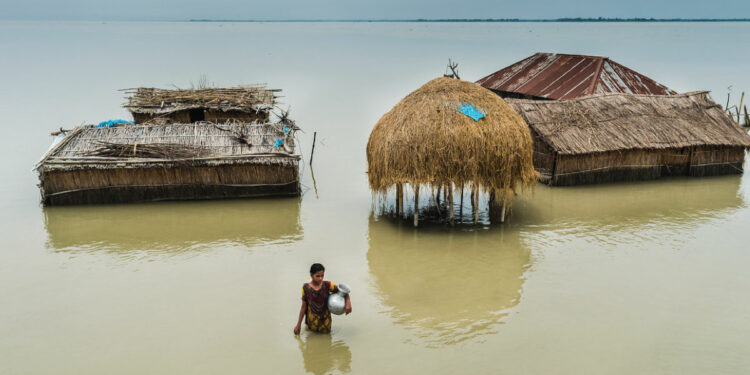Africa’s Climate Change Balancing Act: Green Energy Vs Economic Development
African countries face a conundrum. On the one hand they need to develop economically and industrially. On the other they must also meet their commitments to reduce greenhouse gas emissions globally. This risks a conflict between climate mitigation ambitions and Africa’s development agenda.
There are 45 nations on the United Nations’ global list of “Least Developed Countries”; 33 (72%) are located in Africa. These countries face enormous problems, including low income levels and limited levels of industry. They are also affected by climate change disasters like floods and droughts.
Africa contributes just 4% of the world’s greenhouse gas emissions. But all 54 African countries have ratified the United National Framework Convention on Climate Change’s Paris Agreement. So they’re legally bound to reduce their greenhouse gas emissions. The aim is to prevent an overall global temperature increase of more than 2 degrees Celsius above that of pre-industrial times. In 2024, the world’s temperature exceeded 1.5°C above pre-industrial levels.
I research climate finance and investigated what drives sub-Saharan Africa’s climate ambitions. I also wanted to find out whether wealthier sub-Saharan African nations were more likely to prioritise economic development over aggressive climate commitments than the region’s more impoverished nations.
My research tested how four factors affect climate policy making in sub-Saharan Africa. These are democracy, fossil fuel consumption, gross domestic product per capita, and total historical emissions.
These factors have been identified in prior research into climate ambition. That’s because they reflect accurately how political will, economic capacity, energy dependency, and the historical responsibility for climate change interact with each other to determine how countries tackle the warming climate.
I found that wealthier sub-Saharan African nations (measured by gross domestic product per capita) show lower levels of climate ambition. Nigeria and South Africa, for instance, are wealthier than many others in Africa. But they’re under political and economic pressure to expand energy access and industrial capacity. This can limit them from curbing greenhouse gas emissions.
It’s clear from my study that gross domestic product per capita was the only statistically significant determinant of climate ambition among sub-Saharan African countries. This reveals how economic priorities often shape countries’ climate commitments.
Different ambitions
Four key points emerged in my study.
1. There’s a negative relationship between gross domestic product and climate ambition. Wealthier sub-Saharan African countries may prioritise economic development based on energy-intensive industries over climate action. These countries may also face political resistance to climate action from the coal and petrol sectors, and from industries that depend on fossil fuels.
2. The role of democracy is ambiguous. Pressing economic needs and political instability can mean that democratically elected governments prioritise economic and development goals over long-term climate commitments.
Democratic institutions can have limited capacity. They can also be affected by corruption and political instability. That makes it more difficult for them to influence climate policy.
3. Sub-Saharan African countries that want to continue burning fossil fuels are still willing to curb their carbon emissions. This is likely because agriculture, forestry and other uses of land, instead of fossil fuel-based industry, dominate their economies.
4. Sub-Saharan African countries are focused on adapting to climate change-induced disasters rather than on dealing with emissions. They’re working to improve agricultural practices to cope with drought and developing flood management systems. These countries need to promote climate-resilient infrastructure and implement early warning systems for extreme weather events. This removes the focus from minimising greenhouse gas emissions.
What needs to happen next
I have several recommendations based on my findings.
First, policies must be coherent. Sub-Saharan African governments need to line up their economic growth strategies with climate policies. Green investments and sustainable development projects should be prioritised.
Second, institutions must be strengthened. Governance structures need to become more transparent and accountable. They should strive to involve the public in shaping climate policy.
Third, renewable energy must be promoted, particularly through investments in solar, wind, and hydropower. The region’s natural resources must be used to move countries away from fossil fuels.
Fourth, international support is also key in achieving climate justice for sub-Saharan countries. Developed nations must provide financial aid and other support to the region. For example, they can transfer useful technologies to can support and bolster green growth.
Finally, climate commitments (nationally determined contributions) are not a legal obligation. Because of this, some countries in sub-Saharan Africa do not appear to be making them a priority. Policymakers should make sure that it is feasible for their countries to reduce their greenhouse gas emissions to the levels that they’ve committed to.
My findings show that global climate governance, where countries work together to reduce global warming, can be complicated. Decisions about how sub-Saharan Africa should take part in cooling the planet must be based on what meets the needs of the approximately 1.24 billion people living in the region.








